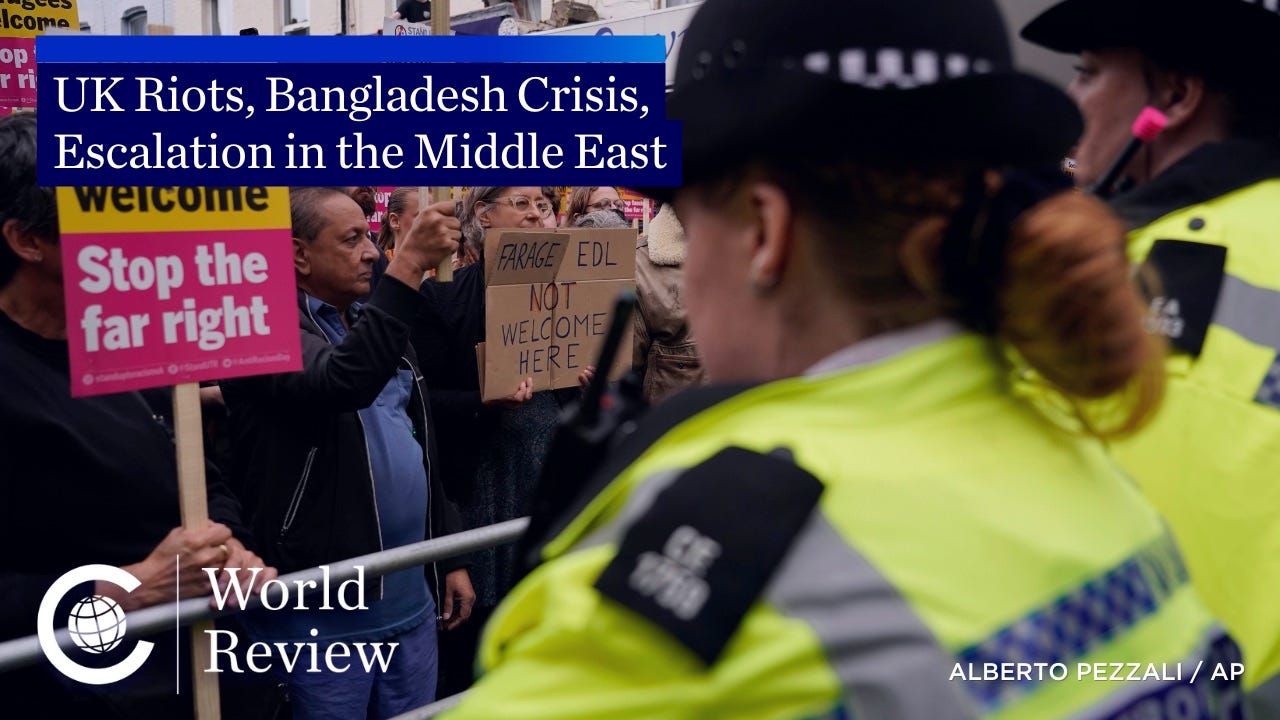World Review: UK Riots, Bangladesh Crisis, Escalation in the Middle East
A brief synopsis of this week's show
Each Friday morning, I host a video podcast called “World Review with Ivo Daalder” where three journalists from major news outlets around the world join me in discussing the latest global news stories of the week.
This morning, August 9, I was joined by Nahal Toosi of Politico, David Luhnow of the Wall Street Journal, and Anton LaGuardia of The Economist
“World Review is always fascinating. I love the fact that you can get journalists from around the world to participate since zoom is the medium.”
— A Subscriber to America Abroad
While I encourage you to watch or listen to the episode (and subscribe wherever you get your podcasts!), here are a few interesting things I took away from our discussion:
Riots in Britain this past week pose the gravest challenge to the new Labor government, which took office just five weeks ago. In cities around the country, right-wing thugs battled police, attacked and threatened mosques and hotels housing refugees. Hundreds have been arrested and jailed. David explained that for any type of social unrest to explode, it needs fuel and a spark. The spark was the brutal stabbing of a dance class, killing three young girls in late July. The fuel was a disinformation campaign that falsely suggested the murderer was a refugee from a Muslim country; in fact, the act was perpetrated by a 17-year old born in Britain to Rwandan parents. But disinformation spread quickly on social media, including through amplification of utterly false posts on X by its new owner, Elon Musk. Deeper causes fueling the unrest are longstanding concerns about immigration, both legal and illegal, which was a contributing factor to Brexit and fueled the rise of the Reform party in the last election. Britain’s long economic crisis has also had a major impact in deprived areas from where many of the thugs hailed. But the government acted swiftly, with the judicial system trying some of the worst offenders and sending them to jail for significant periods. Hopefully, this will deter further violence in the days ahead.
In Bangladesh, meanwhile, student-led protest turned violent over the weekend, ultimately leading to the ouster of the long-ruling government of Sheikh Hasina. An interim government led by Nobel Prize winning economist Muhammed Yunus was sworn in to help restore democracy. The immediate spark of the unrest, Nahal explained, was the restoration of a law that reserved one-third of all government jobs for descendants of those who fought in Bangladesh’s War of Independence in the early 1970s, limiting openings to these prestigious jobs while securing the patronage spoil system for Hasina and her party. But the deeper cause was Hasina’s iron rule that included jailing opponents and rigging elections. What’s most surprising is that an autocrat like Hasina was actually forced from power—a rarity these days. Could it be because she was a woman leader (the number of female autocrats is small)? Or perhaps it was the army’s decision not to shoot the people that caused her to decide to flee the country. Whatever the case, Bangladesh enters a time of extraordinary uncertainty under a widely admired, but older new interim leader.
For the past week, the Mideast has been gripped by the fear of an escalating war, as everyone expected Iran and Hezbollah to retaliate for the killings of top leaders in Beirut and Teheran. As of this morning, nothing has happened—yet. There are growing indications that active U.S. and Arab diplomacy may have led Iran to think twice, though Anton suggested that some form of retaliation was still likely. The difficulty for the United States is that it’s increasingly caught in between its unflinching support for Israel’s right to defend itself and the need to secure a ceasefire in Gaza war, which is fueling the escalation throughout the region. Persuading Teheran to stand down—or convincing Israel to limit its response to any Iranian counter—is meant to square that circle. It’s therefore no coincidence that Washington joined Cairo and Doha in announcing that a ceasefire deal was complete and would be presented next week for both parties to sign up to. Whether the escalation spiral can be held off till then is the big question for the coming week
That’s it for my quick takes of this week’s episode here on America Abroad. To get the full flavor, please listen to the episode itself.



